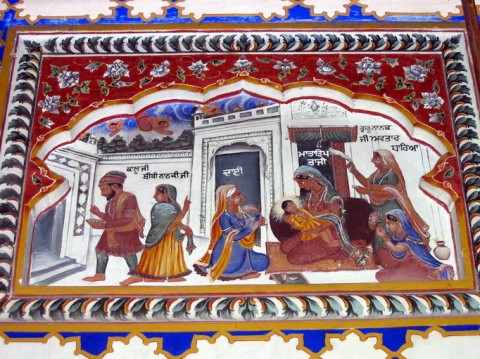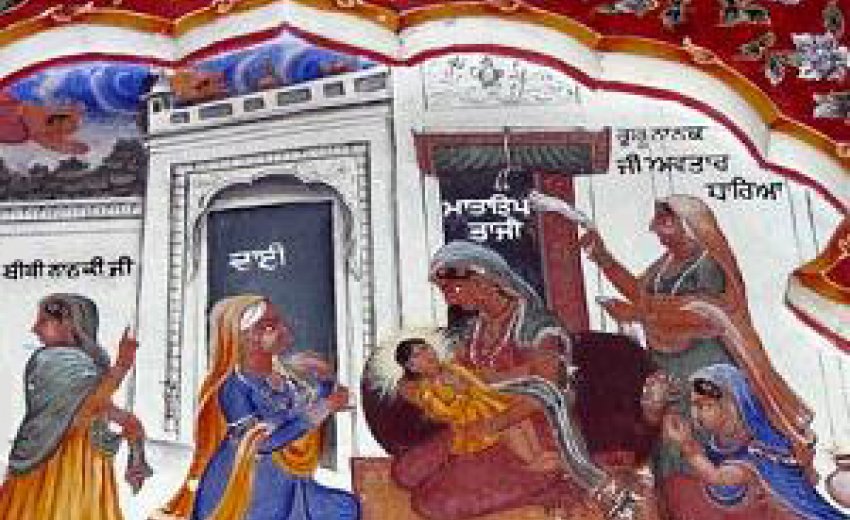 In the home of Khalsa my child is married and I, by following in the steps of Mata Tripta Ji, become a proper mother-in-law.
In the home of Khalsa my child is married and I, by following in the steps of Mata Tripta Ji, become a proper mother-in-law.
In this day and age mothers-in-law are famous for not getting along with their daughters-in-law. We are often questioned "Why is a woman another woman’s biggest enemy?" This does not need to be the case. Becoming best friends with our daughters-in-law; all we have to do is look up to Mata Tripta Ji. Mata Tripta Ji helped her daughter-in-law adjust into the new family, helped with the kids and never undermined her daughter-in-law.
So where do things go wrong? The three C's are the core problem. What are they? Compare, Compete and Complain. Constantly comparing yourself to your daughter-in-law instead of lovingly sharing and teaching. Competing with your daughter-in-law for power and attention in the household, and, above all, habitual complaining. Each of these three can undo the relationship, but when all three are present, life can quickly become a living hell.
The kind of relationship that a mother-in-law will share with her daughter-in-law can be determined almost immediately. If the mother-in-law feels insecure about the new daughter-in-law joining the family, there will almost always be animosity between the two. If the mother-in-law is secure about herself and about the daughter-in-law, she will become like a mother and lovingly teach her little tricks to make the family happy together. That’s how Mata Ji was. She treated Mata Sulakhni Ji as a daughter, not as a daughter-in-law. Growing up Guru Nanak Dev Ji was quite different from the other children. As a husband he was different then the normal husband as well. He had a mission, and he had many students. It was a huge adjustment for Mata Sulakhni Ji to quickly learn about Guru Ji and understand the family dynamics before things got off on the wrong foot. Mata Tripta Ji no doubt told Mata Sulakhni Ji details about every family member, so she would have a little help making everyone happy. Imagine, if Mata Tripta Ji was insecure and left Mata Sulakhni Ji to fend for herself in a new family, which was nothing like what she had imagined? Mata Sulakhni Ji and Guru Nanak Dev Ji might not have had the great understanding they had. Mata Tripta Ji was the kind of mother-in-law we can all be if we let go of the three C's and be more of a mother and less worried about whether or not our actions fall within the traditional role.  Mata Tripta Ji not only was a mother to her daughter-in-law, she also helped her raise the children. As much as daughters-in-law might act like super women, becoming a mother is always a new experience and every new mother needs help and support. And as much as mothers-in-law may appear to know everything, such knowledge will prove useless unless her relationship with daughter-in-law is such that the help is welcomed. When a mother-in-law becomes a mother, she earns the right to become a grandmother. Because of the great relationship they shared, when Guru Nanak Dev Ji was gone for long periods of time, Mata Tripta Ji was able to help Mata Sulakhni Ji raise the kids. Mata Tripta Ji was always there to lend a helping hand to Mata Sulakhni Ji. Mata Tripta Ji teaches us all that being a mother-in-law does not mean you retire because you just brought home a maid or that you become your daughter in law's maid. It’s about living with an open heart and finding a balance.
Mata Tripta Ji not only was a mother to her daughter-in-law, she also helped her raise the children. As much as daughters-in-law might act like super women, becoming a mother is always a new experience and every new mother needs help and support. And as much as mothers-in-law may appear to know everything, such knowledge will prove useless unless her relationship with daughter-in-law is such that the help is welcomed. When a mother-in-law becomes a mother, she earns the right to become a grandmother. Because of the great relationship they shared, when Guru Nanak Dev Ji was gone for long periods of time, Mata Tripta Ji was able to help Mata Sulakhni Ji raise the kids. Mata Tripta Ji was always there to lend a helping hand to Mata Sulakhni Ji. Mata Tripta Ji teaches us all that being a mother-in-law does not mean you retire because you just brought home a maid or that you become your daughter in law's maid. It’s about living with an open heart and finding a balance.
Part of finding that balance, is not undermining your daughter-in-law's authority or her undermining yours. One would imagine life was a bit complicated in Mata Tripta Ji’s home with Guru Nanak Dev Ji gone on his travels, Saints stopping by the house and two children that need to be reared. A lot of decisions needed to be made by the ladies of the household. Mata Tripta Ji kept the peace in the family by not undermining any decisions made by Mata Sulakhni Ji and Mata Sulakhni Ji followed her lead. In today’s households we are so busy trying to prove ourselves right that we forget sometimes its best not to be right, if it keeps the peace in the family. I am sure there were instances when Mata Tripta Ji and Mata Sulakhni Ji might not have agreed but they never made it a public affair and talked in private to sort things out, so they don’t happen again. Today we are so worried about making ourselves look good and right in front of others that we forget the effect this public display will have on our family life. We need to learn from Mata Tripta Ji how to find a balance and be a good mother-in-law.
The balance of power is very important in every Sikh household with a joint family. Without balance, one can’t be a good mother-in-law. In a joint household there will almost always be two women sharing the power and you can see a slow transition of power from the mother-in-law to the daughter-in-law as the daughter-in-law becomes more of a mother herself. This transition comes naturally during the adjustment to life with a daughter-in-law, becoming more involved with the grandkids instead of the house work and then finally as you allow the daughter-in-law to make more and more of the decisions without your input. It is the mother-in-law that trains us from being a wife to being a mother and then helps us prepare to become a mother-in-law ourselves. Let us become like Mata Tripta Ji and become more of a second mother than a mother-in-law.

